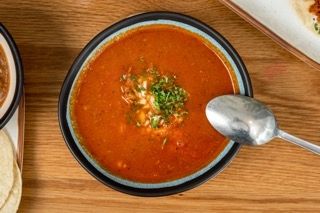Enjoy flavorful freshly made guacamole during lunch
Wiki Article
Is Mexican Food Healthy And Balanced? Unpacking the Nutritional Perks of Traditional Active Ingredients
The concern of whether Mexican food is healthy invites an expedition of its typical ingredients. Beans and corn act as foundational staples, abundant in healthy protein and fiber. Avocados supply advantageous fats, while different natural herbs and spices include flavor and health and wellness advantages - take out and delivery. Together, these components produce a tapestry of nutrition. The healthfulness of Mexican cuisine typically depends on preparation approaches and portion sizes. What function do these factors play in determining its total nutritional value?The Power of Beans: Healthy Protein and Fiber-Rich Staples
Although usually forgotten, beans function as a foundation of Mexican cuisine, using a wealth of nutritional benefits. Rich in healthy protein, they are an exceptional plant-based alternative for those looking for to satisfy their dietary healthy protein needs. This high healthy protein material supports muscle repair and development, making beans invaluable for both vegetarians and meat-eaters alike. Additionally, beans are a phenomenal resource of dietary fiber, which assists in digestion and advertises a sensation of fullness, possibly assisting with weight administration.The range of beans utilized in Mexican meals, such as black beans, pinto beans, and kidney beans, contributes to a varied taste account and can enhance dishes nutritionally. Beans are reduced in fat and contain important vitamins and minerals, consisting of magnesium, iron, and folate. With each other, these characteristics make beans a critical ingredient, providing both nourishment and nutrition in standard Mexican fare.

Corn: a Versatile Grain With Nutritional Benefits
Corn stands apart as a flexible grain essential to Mexican food, commemorated not just for its cooking applications however likewise for its remarkable dietary account. As a main active ingredient in meals like tortillas, tamales, and pozole, corn offers necessary nutrients that add to a balanced diet regimen. Rich in carbohydrates, it works as a significant power resource, while likewise being low in fat, making it a favorable option for numerous dietary demands.Corn is an excellent resource of dietary fiber, which helps in food digestion and promotes satiation. It has significant quantities of vitamins such as B-complex vitamins, which are crucial for basal metabolism. The presence of antioxidants, especially carotenoids, contributes to general health and wellness by lowering oxidative anxiety. Furthermore, corn is gluten-free, providing to those with gluten level of sensitivities. In general, the nutritional benefits of corn underscore its significance in conventional Mexican food and its function in a healthy and balanced diet plan.
Avocados: Healthy And Balanced Fats and Nutrients in Every Bite
Avocados play a considerable role in Mexican cuisine, enhancing meals with their velvety texture and rich flavor. Past their culinary allure, avocados are celebrated for their outstanding dietary account. They are a rich resource of healthy monounsaturated fats, which can help reduced negative cholesterol degrees and assistance heart health and wellness. In addition, avocados are packed with vital minerals and vitamins, consisting of potassium, vitamin E, and B vitamins, contributing to general health.The high fiber web content in avocados aids digestion and advertises satiation, making them a helpful addition to any kind of meal. Their special nutrient make-up can also sustain skin wellness and supply anti-inflammatory advantages. Including avocados into traditional Mexican meals or appreciating them as a standalone treat can boost both flavor and nutrition, showing why they are a precious staple in Mexican food. Overall, avocados provide a delicious way to take pleasure in healthy fats and critical nutrients in every bite.

Natural Herbs and flavors: Flavorful Wellness Boosters
While delighting in the rich tastes of Mexican cuisine, one can not overlook the crucial function that spices and natural herbs play in boosting both preference and wellness. Ingredients such as cilantro, oregano, and chili peppers not only add to the dynamic taste profile however also provide significant health and wellness benefits. Cilantro is recognized for its detoxifying residential properties, aiding to remove heavy metals from the body, while oregano is packed with anti-oxidants and has anti-inflammatory impacts.Chili peppers, a staple in several Mexican meals, include capsaicin, which has been linked to improved metabolism and discomfort relief. In addition, seasonings like cumin and coriander support digestion and may aid in blood sugar level regulation. Incorporating these delicious wellness boosters right into meals not only enhances the cooking experience but also promotes overall health, making Mexican cuisine not just scrumptious, but also nutritionally beneficial.
Typical Cooking Approaches: Enhancing Nutrition and Flavor
Conventional food preparation methods in Mexican cuisine play a necessary function in boosting both nourishment and flavor, as they often focus on fresh active ingredients and time-honored methods. Methods such as nixtamalization, where corn is saturated and cooked in an alkaline solution, not only improve the nutrient profile of tortillas yet also boost their digestibility - New York Times rated. In addition, using slow-moving cooking approaches, like cooking or braising, enables flavors to meld beautifully while keeping the integrity of the ingredientsOften Asked Concerns
Are Mexican Food Portions Usually Larger Than Various Other Cuisines?
Mexican food sections are often bigger than those of several various other cuisines. This particular shows traditional eating practices, emphasizing public sharing and hearty dishes, which can cause an extra considerable offering dimension on the whole.
Just how Does the Prep Work Method Affect Healthiness of Mexican Food?
Preparation methods considerably influence the healthiness of Mexican food. Methods such as cooking or steaming preserve nutrients, while frying can increase unhealthy fat content. Choices of components and cooking styles eventually establish overall nutritional value.Can Mexican Food Be Customized for Specific Dietary Limitations?
Mexican food can undoubtedly be customized for specific dietary restrictions. Alternatives, such as utilizing corn tortillas for gluten-free diet plans or including even more veggies, make it possible for people to enjoy traditional flavors while accommodating various nutritional needs.What Are Usual False Impressions About Mexican Food and Health And Wellness?
Usual misconceptions concerning Mexican food consist of the idea that it is inherently harmful, overly spicy, and entirely focused on fats. In truth, conventional meals typically include nourishing ingredients and can be tailored to different dietary needs.Exist Much Healthier Choices at Mexican Restaurants?
Healthier alternatives at Mexican restaurants often consist of smoked meats, beans, and fresh veggies. Selecting meals that emphasize entire active ingredients and preventing heavy sauces can bring about an extra nourishing dining experience, promoting total health.The range of beans used in Mexican dishes, such as black beans, pinto beans, and kidney beans, adds to a diverse taste profile and can boost dishes nutritionally. Avocados play a considerable role in Mexican food, matching dishes with their luscious structure and rich taste. Including avocados right into typical Mexican recipes or enjoying them as a standalone treat can boost both taste and nutrition, showing why they are a beloved staple in Mexican cuisine. While enjoying the rich tastes of Mexican food, one can not overlook the crucial function that spices and natural herbs play in boosting both taste and health and wellness. Standard food preparation techniques in Mexican food play a necessary function in improving both nutrition and flavor, as they commonly prioritize fresh active ingredients and time-honored strategies.
Report this wiki page